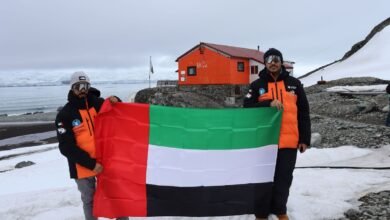
NEOM Backs Major Biomanufacturing Expansion Plan
NEOM has made one of its most important breakthroughs in environmentally responsible food production. The company has partnered with Liberation Labs to pioneer precision-fermentation biomanufacturing. Liberation Labs’ success is a big deal as it means that their Letters of Intent exceed 200% capacity for their first facility. This shows the market’s strong need for animal-free protein production.
Saudi Arabia now stands at the vanguard of advanced food technology. NEOM’s project will establish a state-of-the-art biomanufacturing facility in the region. Through collaboration with Liberation Labs, they will create high-skilled jobs and reduce food imports. This mutually beneficial alliance helps tackle food security challenges. The investment reshapes the scene of traditional food systems to meet the growing population’s needs in the face of climate challenges.
NEOM Investment Fund Secures Strategic Partnership with Liberation Labs

Image Source: NEOM
NEOM Investment Fund (NIF) has announced a new investment in Liberation Labs, a global leader in precision-fermentation biomanufacturing. Through collaboration with Liberation Labs, Topian, NEOM’s food company, will design and develop an advanced precision-fermentation facility in Saudi Arabia.
The first phase of this alliance involves Liberation Labs conducting a complete feasibility study. The study will determine the best location, design timeline, construction schedule, and launch date of the facility. This move follows NEOM’s involvement in Liberation Labs’ $50.5 million (AED 185.43 million) fundraising round announced in January 2025.
Majid Mufti, CEO of NIF, highlighted the importance of this alliance: “This strategic partnership marks an important step on NEOM’s journey to become a global hub for industrial-scale sustainable food production. Liberation Labs’ expertise in precision fermentation and biomanufacturing will advance the establishment of NEOM as a leader in the biomanufacturing space”.
Liberation Labs builds specialized facilities that employ precision fermentation to produce simple food ingredients. Their approach offers an expandable, eco-friendly alternative to traditional production methods and creates high-value proteins without animals. Their first facility in Richmond, Indiana, has already secured Letters of Intent for over 200% of its available capacity for the first five years.
Mark Warner, Founder and CEO of Liberation Labs, shared his excitement about the collaboration: “The development of our first site in the Middle East, in partnership with NIF and Topian, is an incredible opportunity to blend our purpose-built biomanufacturing with their purpose-driven organizations”.
Dr. Juan Carlos Motamayor, CEO of Topian, explained how this partnership tackles urgent challenges: “At Topian, we are transforming food systems to meet the needs of a growing population and a changing climate. The establishment of this advanced biomanufacturing facility will enable us to produce key food ingredients and high-quality alternative proteins efficiently and sustainably”.
This investment will reduce food imports and boost food security. On top of that, it will create economic opportunities and high-skilled jobs, giving Saudi Arabia an edge in the emerging novel-food sector.
Saudi Arabia Advances Food Security Through Precision Fermentation

Image Source: Arabian Business
Saudi Arabia’s Vision 2030 places food security at the heart of its economic transformation plans. The Kingdom has invested AED 36.72 billion to boost domestic agriculture and stabilize global food supply chains. This major investment shows a fundamental change toward self-reliance, especially important in a region that faces an arid climate with limited farmland and a lack of water.
Precision fermentation technology has emerged as a key breakthrough to tackle these challenges. The alternative protein sector sees microbial proteins and lab-grown ingredients growing at 14% each year. This technology allows Saudi Arabia to efficiently produce valuable proteins without animals and provides an environmentally responsible alternative to traditional food production.
NEOM leads this transformation as a testing ground for future food technologies. The project wants to deliver 600,000 metric tons of environmentally responsible food by 2030. It tackles both food security issues and environmental challenges head-on. NEOM tests innovative solutions for food production in regions where water is scarce.
Dr. Juan Carlos Motamayor of Topian shared the bigger picture: “This investment will not only help reduce food imports and improve food security but will also create new economic opportunities and high-skilled jobs, giving the Kingdom a competitive advantage in the dynamic, high-value novel-food sector”.
Saudi Arabia tackles production challenges through several key initiatives:
- Using desalinated water for irrigation while cutting down groundwater use
- Adopting advanced farming technologies like hydroponics and vertical farming
- Using data analytics and IoT sensors for precise farming to optimize water use
- Improving food supply chains with smart packaging and cold chain logistics systems
The Kingdom’s focus on biomanufacturing and precision fermentation creates opportunities for local food technology entrepreneurs. Regional companies now invest heavily in greenhouse technologies, irrigation with desalinated seawater, and agricultural AI and robotics.
This complete strategy shows how Saudi Arabia revolutionizes traditional food systems. It meets the needs of a growing population despite climate challenges and establishes itself as a global center for sustainable food production technologies.
NEOM City Saudi Arabia Transforms into Global Biomanufacturing Hub

Image Source: Fast Company Middle East
NEOM’s investment in Liberation Labs shows its faster evolution into a global biomanufacturing hub. This development lines up with Saudi Arabia’s National Biotechnology Strategy to make the Kingdom a biotech leader by 2040. The megacity project wants to blend biotechnology in sectors of all types to improve quality of life.
The megacity acts as a living laboratory where companies develop and test sustainable food technologies. This innovative ecosystem sits in northwest Saudi Arabia and has already achieved most important progress. Topian, its sustainable food company, opened its first climate-resilient greenhouse in Oxagon, NEOM’s industrial city on the Red Sea coast. The four-hectare facility produces food while using minimal water and energy, yielding nearly 4,000 tons of fruit and vegetables yearly.
Juan Carlos Motamayor, CEO of Topian, says “This project enables us to control the climate for plant growth in an environmentally friendly manner… while developing AI-driven predictive models for the operation of more efficient greenhouses elsewhere in the region”.
NEOM’s biomanufacturing vision goes beyond agriculture. The project focuses on 14 specialized investment sectors including biotechnology, food, advanced manufacturing, and digital sciences. The city wants to create innovative solutions for extreme weather conditions in a world facing climate change.
NEOM runs on innovation through several initiatives:
- Water and Food Innovation Hub
- Aquaculture Innovation Center
- Agriculture and Aquaculture Consortia
- Food Accelerator program
This all-encompassing approach supports Saudi Arabia’s broader biotechnology sector. The sector will add AED 127.05 billion to non-oil GDP by 2040 (3% of total) and create 11,000 jobs by 2030, growing to 55,000 by 2040.
NEOM’s transformation into a biomanufacturing hub showcases Saudi Arabia’s strategy to lead regional biotechnology. The city doesn’t just tackle food security challenges – it creates a fundamental change in sustainable food production for water-scarce environments. This model can benefit regions worldwide.
NEOM and Liberation Labs have joined forces to make Saudi Arabia a world leader in green food production. Their collaborative effort uses precision fermentation technology and specialized facilities to tackle food security challenges and create new economic opportunities. NEOM leads the way as a pioneer in quick food production methods by combining advanced farming technologies, smart systems, and biotechnology breakthroughs.
Saudi Arabia has invested AED 36.72 billion to reshape traditional food systems. These initiatives will create 55,000 jobs by 2040 and add AED 127.05 billion to non-oil GDP. NEOM’s groundbreaking ecosystem shows other regions worldwide how sustainable food production can succeed even with limited water resources.
The changes go beyond solving immediate food security issues. NEOM has become a complete biomanufacturing center. Topian’s climate-resilient greenhouse proves these advanced technologies work in real life by producing 4,000 tons of produce yearly. Saudi Arabia’s path toward food independence and technological leadership creates new standards for green development in challenging climate conditions.






